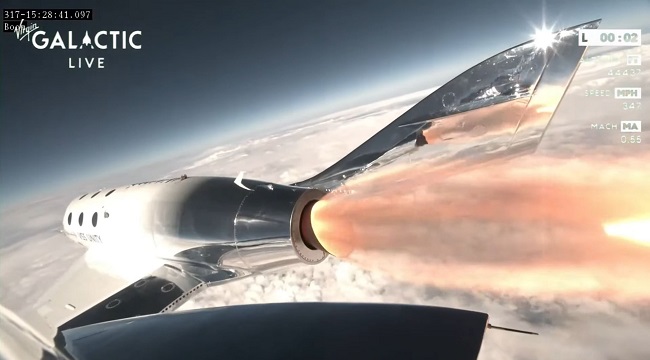Virgin Galactic made history recently as it successfully flew it’s first paying customers to the final frontier.
This significant achievement puts the company back on track in the emerging private spaceflight sector.
Italian Air Force officers aboard the mission, named Galactic 01, had the opportunity to unfurl their nation’s flag and witness the awe-inspiring curvature of Earth during moments of weightlessness at an altitude of 52.9 miles (85.1 kilometers) above sea level.
Colonel Walter Villadei, one of the officers, expressed his delight at the experience, particularly highlighting the stunning contrast between the darkness of space and the planet below.
Read also: Côte D’Ivoire to launch first satellite in space
The Journey Begins: From Mothership to Rocket-Powered Plane
The mission commenced when a colossal twin-fuselage “mothership” aircraft took off from Spaceport America, New Mexico, at approximately 8:30 am local time (1430 GMT) on June 29.
After reaching high altitude, the carrier plane released the rocket-powered plane, named VSS Unity, which accelerated to nearly Mach 3, soaring into space. While NASA and the US Air Force consider the border of space to be at 50 miles, the internationally recognized boundary, known as the Karman Line, stands at 62 miles high.
Overcoming Challenges: Virgin Galactic Journey of Resilience
Virgin Galactic’s path to this milestone was not without obstacles. Following founder Richard Branson’s test flight in 2021, the company faced setbacks, including a brief grounding by the Federal Aviation Administration (FAA) due to a deviation from assigned airspace and inadequate communication. Furthermore, lab testing revealed that certain materials used in their vehicles did not meet the required strength margins, leading to necessary fleet upgrades. However, the company successfully conducted five test flights before resuming spaceflights in May, paving the way for Galactic 01.
Advancing Scientific Research: Experiments in Microgravity
The Galactic 01 crew had the important task of conducting 13 supervised and autonomous experiments while collecting data on their suits and sensors in the cabin. These experiments ranged from measuring radiation levels in the mesosphere to studying the behaviour of liquids and solids in microgravity.
Colonel Villadei emphasized the significance of Virgin Galactic’s contribution, as it offers a valuable “gap filler” for researchers seeking to work in microgravity, bridging the gap between parabolic airplane flights and long-term missions to the International Space Station.
Looking Ahead: Commercial Flights and Future Missions
Founded in 2004, Virgin Galactic has already sold approximately 800 tickets for future commercial flights. This includes 600 tickets sold between 2005 and 2014, priced between $200,000 and $250,000, and an additional 200 tickets since then, each priced at $450,000.
While initially attracting movie stars and celebrities, the company experienced a tragic incident in 2014 when a space plane broke apart midair during a test flight, resulting in the loss of the copilot’s life and severe injuries to the pilot. Undeterred, Virgin Galactic now looks to the future, with the next mission, Galactic 02, scheduled for August, followed by monthly space hops.
Competing in the Space Tourism Sector
Virgin Galactic operates in the “suborbital” space tourism sector and faces competition from Jeff Bezos’s Blue Origin. Blue Origin had successfully sent 32 people into space using a vertical lift-off rocket but experienced an accident during an unmanned flight in September 2022, leading to a temporary grounding of its rocket. However, the company has announced plans to resume spaceflight soon.
Elon Musk’s SpaceX, on the other hand, has collaborated with partner companies to offer trips to Earth orbit and the International Space Station. However, chartering a SpaceX rocket for such journeys comes at a significantly higher cost, with tickets for joint SpaceX-Axiom Space missions to the ISS reportedly running into tens of millions of dollars.
Despite the competition, Virgin Galactic’s successful flight to the final frontier marks a significant milestone in the private spaceflight sector. With its focus on suborbital space tourism, the company aims to offer customers a unique and accessible space experience. By providing a platform for scientific research in microgravity, Virgin Galactic not only caters to space enthusiasts but also contributes to advancements in various fields of study.
The future looks promising for Virgin Galactic as it plans to continue its commercial flights and expand its mission frequency. With Galactic 02 set for August, the company is determined to establish itself as a reliable provider of space experiences. As technology and infrastructure continue to improve, the potential for space tourism to become a mainstream industry grows, opening up possibilities for more individuals to explore the wonders of space.
Virgin Galactic has demonstrated its commitment to providing safe and memorable space experiences. With ongoing advancements and future missions on the horizon, Virgin Galactic aims to carve out a prominent position in the emerging private spaceflight sector, offering both tourists and researchers an opportunity to explore the mysteries of space.
